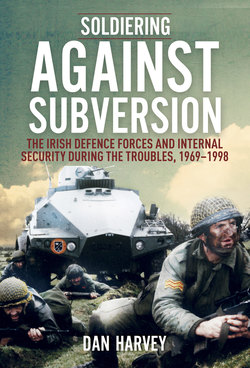Читать книгу Soldiering Against Subversion - Dan Harvey - Страница 10
На сайте Литреса книга снята с продажи.
ОглавлениеPreface
From an Irish Defence Forces perspective, it was manpower, equipment, procedures and training that made Internal Security Operations possible during the Troubles. Skills, expertise and experience made them successful. Organisationally, it was all about capacity and capabilities; operationally, it was all about command and control; individually, it was all about commitment and courage. Soldiering against subversion required dedicated people prepared to withstand difficulty and hardship, poor pay and conditions, and yet be prepared to risk their lives in the process. The ‘What’ of government security policy was the preserve of the politicians, the ‘How’ of its implementation the problem of the security forces.
The North of Ireland had begun to fall apart, and from a starting point of chronic underinvestment and lack of preparedness the Irish security forces, despite the pressure of events, had to prevent the Republic going the same way. Mostly, this security forces’ involvement was undramatic and their presence, posture and persistence went largely unnoticed and certainly unheralded, yet it was absolutely crucial. To disrupt the danger and threat from the IRA, to counter the fear and intimidation and to reduce the harm and hazard from the ‘balaclava bandits’ required competent people with a serious purposefulness. In the case of the Defence Forces, this critical commitment was neither adequately remunerated nor acknowledged. The Troubles were grim, forbidding and severe times, best forgotten and put out of mind; only omitted along with them has been the unwavering loyalty, the steadfast reliability and the staunch patriotism of the Defence Forces. To read this book is to understand the need for an army.
I began working on Soldiering Against Subversion two years before the fiftieth anniversary of the outbreak of the Troubles, generally regarded to be 5 October 1968, and it is a book about – in a word – recognition. The recognition, as genuine, valid and worthy, of the contribution of the Defence Forces to the Irish State during the period. For the first time, it describes this involvement from the point of view of the Defence Forces, a slant largely absent in accounts to date. It places their extensive effort in context and presents a reasoned analysis of the Aid to the Civil Power application against the alarmingly chaotic and disorderly rhythm of the continually challenging circumstances presented from 1969 to 1998. This book is necessary because it is too easy to forget those difficult days and it is dangerous to do so, because the complexity of the fractured identity that was at the essence of the Troubles in a sense still remains to be resolved today. The Defence Forces played a crucial part in its containment.
The Defence Forces defended Ireland, protected its people and secured the safe functioning of the State’s institutions against those who wished to undermine it. The Irish Republic was a sovereign independent state, with an elected parliament and courts, police and army to enforce the rule of law. The Provisional IRA (PIRA) sent out foot soldiers to wreak havoc, bomb indiscriminately, and kill without compunction. They had to be stopped and the Defence Forces contributed hugely in this regard. Ex-Taoiseach Liam Cosgrave put it succinctly, and for all his retired life was consistent in his conviction, that ‘except for the Garda Síochána and the Defence Forces there would have been no state’. To further explain the role of the Irish Defence Forces during the turbulent period of the Troubles, I sought the advice and assistance of those who were there, real experiences from Irish soldiers putting themselves in the line of fire in defence of the State.
What or who caused the Troubles will be an enduring historical argument to be debated for decades to come. However, the hard fact was they had dangerous and tragic consequences and the Irish Defence Forces had to deal with them in a rapidly deteriorating security situation. In order to curtail the impact of the violence, both perpetrated and threatened, they had to initially bridge equipment, establishment, experiential and expertise gaps and thereafter implement a highly nuanced Internal Security Policy. The role of the Defence Forces in maintaining the stability of the state was critical; the importance of having good people crucial. It is their voice that gives this account perspective and professionalism, and, in all its honesty, truth and detail, a large degree of authenticity.
To ensure this bone fide reliability accurately imparts a true sense of the situation, it was imperative that interviewees could do so without the constraint of knowing they would be directly quoted, so that they could more freely give an honest, correct, responsible, considered and not sensationalised sense of their experiences. I believe this to have been achieved. Many were happy to be attributed but, finally, whether recollections have been credited or not, the judgement to do so was mine. It is my sincere hope that additional historical research into these fraught and frightening times is conducted in future years so that the valuable contribution of the Defence Forces is recognised as it richly deserves.
